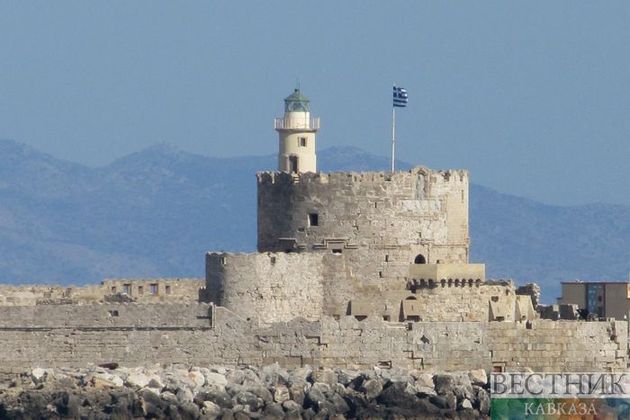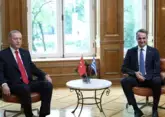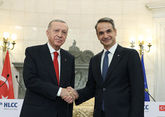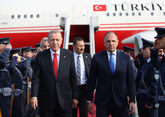80 million Turks will not wrestle 10 million Greek brothers and sisters to the ground, but many are concerned about the interests of the Turkish diaspora in Western Thrace and the Aegean Islands, Hakki Ocal writes in the article for Daily Sabah.
Even though you can almost touch Kastellorizo (Megisti-Meis) from Kaş, near Antalya, we take our passports with us when we go swimming in the Büyükçakıl or Küçükçakıl beaches. Who knows, if you swim a little far and the Greek coast guard may fish you out of the sea. Yet, it is a Greek territory. It is not hard to accept; that is what had happened at the Paris conference in 1946. Turkey could have objected to it and it could have gone to international litigation. It had chosen not to.
The 46 islands in the "Egeo Pelagos" (Aegean archipelago) are now recognized Greek territory, and Turkey, as a peaceful and respectful member of the United Nations has been and will be recognizant of this. Not just the islands, Turkey has also been swindled off its lawful territory in Western Thrace. Okay, I take the word “swindle” back. Perhaps it was the unfortunate result of something psychologists call “learned helplessness”; perhaps the Turkish government took the Kemalist dictum “Peace at home, peace in the world” too much to heart. Turkey was trying to secure its place in the family of nations the Ottomans were booted from for denying nations under its rule the “opportunity of autonomous development” – as former U.S. President Woodrow Wilson claimed, and the world accepted.
Islands, islands, islands
With equal resolve, I will express a fact: Greece cannot arm those islands that have been put under Greek sovereignty in the aforementioned Paris agreement: Lesvos (Lesbos-Midilli), Chios (Sakız), Samos (Sisam), Icaria (Ahikerya), Lemnos (Limni), Samothrace (Semadirek), Karpathos (Kerpe), Kastellorizo (Megisti-Meis), Rhodes (Rodos), Symi (Sömbeki), Tilos (Ileki), Kos (Istanköy), Kalymnos (Kelemez), Leros (Ileryöz), Patmos (Batnoz), Psara (Ipsara), Kasos (Çoban), Nisyros (Incirli), Leipsoi (Ilipsi) and Halki (Herke).
On these 20 islands, neither the Greek government nor its agents (read: the French and the Americans) can store, emplace or deploy any arms other than the small firearms that law enforcement forces carry. They cannot fortify these islands, either. Kapish? Καπίς?
Now, what does the Greek government’s deploying heavy arms on these islands do to the Paris agreement to which I have been bending over backward showing my respect? It voids, abrogates, utterly destroys, headshots. Right? When you abolish an international agreement, what do the other parties do? Keep sheepishly accepting it? That is a question that Turkey’s allies and friends in NATO, namely Greece, France and the United States should answer now. If they don’t answer the question now it may be too late to keep the Paris agreement as it is.
Note to Mitsotakis
I am dwelling on this issue of the fortification and arming of the Greek Islands because of what Greek Prime Minister Kyriakos Mitsotakis had implied when he introduced the Greek-French defense pact. He said his government was not only buying six more French Dassault Rafale twin-engine multirole fighter planes – bringing the total number to 24 – and three French-made frigates, but also signing a defense agreement with France that has an article like the NATO agreement: if a third party attacks Greece, France will help defend it.
The NATO agreement has the very same article: if a country attacks Greece, Turkey will be one of the NATO countries to rush to its help! So, Greece now has an alliance within an alliance. In his speech in the Greek parliament, Mitsotakis said this is especially important for his country – in his words – given the situation in the Eastern Mediterranean and the Aegean. He didn’t name names, but everybody understood that he was implying Turkey. Turkey indeed has a couple of issues with Greek actions in those maritime areas. Greece and the Greek Cypriot administration are not respecting the exclusive economic zones of Turkey and the Turkish Republic of Northern Cyprus (TRNC). Turkey has been issuing naval warnings about their actions. Just recently, a rented research vessel violated the Turkish continental shelf and Turkish naval ships had to push the intruder back to international waters. Turkey doesn’t say that those research vessels cannot safely sail the Turkish continental shelf; rather, it says such activities should be coordinated with Turkey.
Let’s assume that Mitsotakis gets his warplanes and frigates soon; if his rented research ship gets pushed back again when it violates Turkish territorial waters, the exclusive economic zone (EEZ) or continental shelf, is he then going to attack the Turkish ships and draw in France? Thank heavens that former Greek Prime Minister Alexis Tsipras also attended that parliamentary session to add that Mitsotakis was only buying a dream from France.










